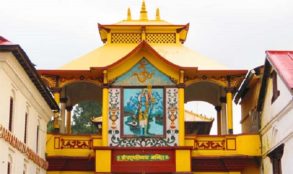
Pashupatinath is dedicated to Lord Shiva and is one of the four most popular holy sites for Shiva devotees in Asia. The site itself is said to have existed since the beginning of the millennium when a Shiva lingam was discovered here, built in the 5th century and later renovated by Malla kings. It is Nepal ‘s largest temple complex, stretching on both sides of the Bagmati River which is considered holy by hindus. The main temple of pagoda architecture has a gilded roof, four silver-covered sides, and exquisite wood carvings. Temples dedicated to a number of other Hindu and Buddhist deities surround the Pashupatinath temple.
Only the Hindus are permitted via the main temple gates. The entrance hall has a Shiva lingam, and the greatest statue of Nandi the bull, Shiva’s vehicle, sits facing the temple. Inside the compound are hundreds of Shiva lingams. Spring ‘s major Maha Shivaratri festival draws hundreds of thousands of devotees from both Nepal and India. Before the Bagmati reaches Pashupati further east is Guheshwori’s temple dedicated to Shiva’s consort Sati Devi. The Pashupatinath Temple is one of the seven Kathmandu Valley UNESCO Cultural Heritage Sites. Additionally, it is a cremation site where Hindus’ last rites are performed.
Rituals at Pashupatinath Temple
Pashupatinath is one of the world’s few living cultural heritage sites too. Pashupatinath is the center of energy with active participation of people at all times of the day, every day, unlike other cultural sites or museums. The Pashupatinath Temple Daily Rituals are as follows:
- • 4:00 am: West gate opens for visitors.
- • 8:30 am: After arrival of Pujaris, the idols of the Lord are bathed and cleaned, clothes and jewellery are changed for the day.
- • 9:30 am: Baal Bhog is offered to the Lord, or breakfast.
- • 10:00 am: Then people who would like to do Puja will be welcome to do so. It is also called Farmayishi Puja, by which people tell the Pujari for specific reasons to perform a special Puja. The Puja continues into the afternoon until 1:45 pm.
- • 1:50 pm: In the main Temple of Pashupati, lunch is given to the Lord.
- • 2:00 pm: Morning prayers end.
- • 5:15 pm: The Aarati evening starts at the main Pashupati temple.
- • 6:00 pm onward: The Bagmati Ganga Aarati which is performed by the Bagmati banks has gained popularity in recent times. For Sundays, Mondays and on special occasions, larger crowds attend. In the evening Ganga Aarati is performed along with Shiva’s Tandava Bhajan, written by Ravana.
- • 7:00 pm: Doors close.